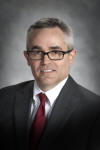
| Final MST Session Punctuated with Stirring Presentation by Dr. Matt Larson |
The Greater Birmingham Mathematics Partnership held its last professional development session for 36 Mathematics Support Team Teachers (MSTs) on May 8, 2012 at Birmingham-Southern College. As a finale to our work with, and to celebrate the accomplishments of these teacher leaders, GBMP arranged for a luncheon/presentation sponsored by Houghton Mifflin Harcourt in the Executive Dining Room at Birmingham-Southern College featuring Dr. Matt Larson as the guest speaker. In addition to the MSTs, GBMP invited the Superintendents and Principals from all GBMP partner districts and schools.
|
·
Instruction.
A paradigm shift to lesson
designs that embed the Standards for
Mathematical Practice into teachers’
daily lesson plans so that students
develop deep conceptual
understanding of the content.
·
Curriculum. A
paradigm shift to a “less is more”
orientation with respect to
curriculum – fewer content standards
taught at a higher level of
cognitive demand.
·
Assessment. A
paradigm shift toward formative
assessment as a multifaceted and
continuous process used to guide
instruction and support student
learning.
·
Intervention. A
paradigm shift toward grade level or
course-based teams of teachers
implementing required responses to
intervention for all students.
This may require additional
instructional time for some students
and finding and prioritizing this
time will be a critical test of
school leadership.
·
Professional
Development. A paradigm shift to
move the grain size of professional
development beyond the individual
teacher working in isolation, to
teachers working in grade level or
course-based collaborative teams
focused on designing and evaluating
the effectiveness of lessons. |
If all five paradigm shifts are addressed, then
the CCSSM is likely to remain a significant force in mathematics
education into the foreseeable future and positively impact
the learning of all
students.
Dr. Larson's dynamic presentation was very well received. On post session surveys, 96% of those attending the lecture "agreed" or "strongly agreed" that the presentation was "informative and of practical value." Survey results for the MSTs (only) concerning the MST program as whole, also yielded very affirming results. Ninety-seven percent (97%) of the MSTs responded that they "agreed" or "strongly agreed" with the following survey items:
1.
The
multi-year MST program has strengthened my mathematical content
knowledge.
2.
The
multi-year MST program has strengthened my understanding of how to
implement inquiry-based instruction.
3.
The
multi-year MST program has strengthened my leadership skills.
4.
The MSTs
are a community of learners that has developed trust and mutual
respect.
Identifying and working with MSTs, mathematics teachers who took the responsibility to be building-level leaders in improving mathematics instruction at their schools, was a focus of GBMP dating back to the early days of National Science Foundation support in 2004-2005. Over the course of the the project, 2005-2012, several cohorts of Mathematics Support Team teachers have received, in total, nearly 16,000 hours of professional development by means of MST sessions.